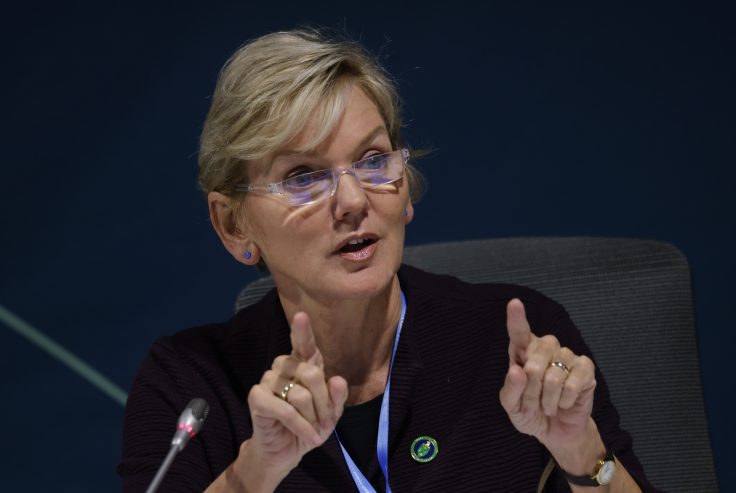Energy Secretary Jennifer Granholm Spends Final Days in Office Sending Billions to Home State, Defying Inspector General
Energy Department’s inspector general warned that agency officials are not complying with conflict-of-interest rules

The Department of Energy, in one of its final actions under President Joe Biden, earmarked billions of dollars in green energy loans to utility companies based in Energy Secretary Jennifer Granholm’s home state of Michigan—defying the agency’s inspector general, who called on the Biden administration to suspend the loan program amid conflict-of-interest concerns.
Some of Granholm’s largest campaign benefactors during her Michigan gubernatorial campaign were among the companies receiving the hefty last-minute loans.
The Department of Energy’s Loan Programs Office announced Thursday that it awarded a staggering $22.9 billion in loan guarantees for utility companies to develop green energy projects across 12 states. More than $14 billion of that total was awarded to DTE Energy and Consumers Energy, the two companies with ties to Granholm, solely for projects in Michigan.
In addition, on Friday afternoon, the office announced a $1.3 billion loan for Michigan Potash Company to help fund a sustainable fertilizer plant in Osceola County, Michigan.
DTE Energy’s political action committee contributed more than $34,000 to Granholm’s 2006 gubernatorial campaign, according to state records. Then-DTE Energy CEO Stephen Ewing, whom Granholm appointed to serve on the state’s Early Childhood Investment Corporation Executive Committee, personally donated another $3,400 to Granholm’s campaign in 2004.
Consumers Energy’s political action committee gave Granholm’s gubernatorial campaign $25,000 in that same timespan, additional data show. And Brandon Hofmeister, the company’s current senior vice president of strategy, sustainability, and external affairs, served as Granholm’s energy and climate policy adviser and deputy legal counsel when she was governor.
The outsized lame duck spending benefiting Michigan is the latest activity from the Loan Programs Office to raise questions about the integrity of the office’s spending programs. Since the 2022 Inflation Reduction Act reactivated the office, giving it tens of billions of dollars in lending authority and making it a central pillar in the Biden administration’s climate agenda, it has unveiled an eye-popping $107.4 billion in green loans, the vast majority of which has come following President-elect Donald Trump’s victory in November, according to a Washington Free Beacon analysis.
Biden administration officials have continued to dole out lucrative loans even after the Department of Energy’s inspector general issued a report in December calling on the Department of Energy to suspend the program. The watchdog warned that agency officials are not complying with conflict-of-interest rules and that the program carries a “significant risk of fraud.”
The Free Beacon reported in January, for example, that Loan Programs Office director Jigar Shah held a financial stake in Plug Power through his green investment firm before joining the Biden administration, raising conflict-of-interest concerns. The Loan Programs Office finalized a $1.7 billion loan for Plug Power on Thursday.
Chris Wright, Trump’s nominee to lead the Department of Energy, said during his Senate confirmation hearing Tuesday that he was aware of the inspector general report and would immediately address the program if confirmed.
CNBC first reported Granholm’s financial ties to DTE and Consumers Energy in 2020 after Biden picked her as his nominee for energy secretary. Granholm served as governor of Michigan between 2003 and 2011.
“I am proud of the dedicated federal workforce that has been and will continue to be committed to using all the tools available to ensure our nation stays competitive and energy secure,” Granholm said in a statement Friday touting her agency’s accomplishments over the last four years.
The Department of Energy did not respond to a request for comment.



